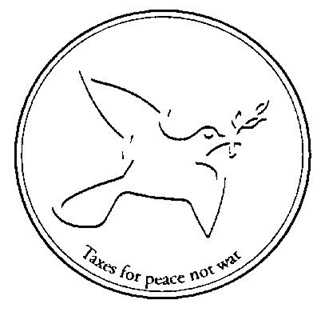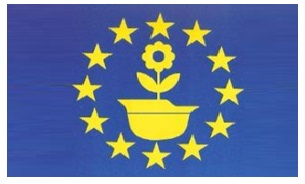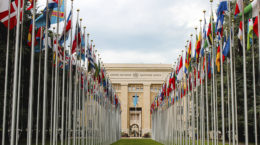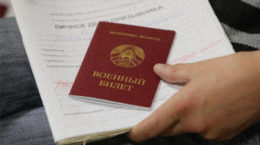This UPR report, submitted for the 50th session in November, documents serious human rights violations in Belarus amid its hybrid involvement in the war in Ukraine — including the militarisation of children, systemic repression, and the erosion of civil liberties. It places particular focus on the persecution of conscientious objectors, deserters, draft evaders, human rights defenders, and anti-war activists, urging the UN to hold Belarus accountable for deepening authoritarian control and forced militarisation.
50th Session of the Working Group
November 2025
April 7, 2025
 International Centre for Civil Initiatives “Our House” (Belarus & Lithuania),
International Centre for Civil Initiatives “Our House” (Belarus & Lithuania),
Kareivių g. 11, Vilnius, Lithuania www.nash-dom.info
 Conscience and Peace Tax International (CPTI),
Conscience and Peace Tax International (CPTI),
1 Peace Passage, Brecknock Road, London N7 0BT, UK www.peacetaxinternational.org
1830 Connecticut Ave NW Washington, DC 20009 www.centeronconscience.org
European Bureau for Conscientious Objection (EBCO)
35 Van Elewyck Street, 1050 Brussels, Belgium www.ebco-beoc.org
 International Fellowship of Reconciliation – International Secretariat
International Fellowship of Reconciliation – International Secretariat
Postbus 1528 3500 BM Utrecht The Netherlands www.ifor.org
 Fellowship of Reconciliation USA (FORUSA)
Fellowship of Reconciliation USA (FORUSA)
Box 271, Nyack, NY 10960. www.forusa.org
 International Fellowship of Reconciliation Austria
International Fellowship of Reconciliation Austria
Lederergasse 23/3/27 A-1080 Wien, Austria. www.versoehnungsbund.at/
68 rue de Babylone F-75018 Paris France www.mirfrance.org/MIR
Marienstr. 19-20, Berlin, Germany www.ipb.org
513 E. Main St. #1484, Charlottesville VA, USA, www.world.beyondwar.org
5 Caledonian Road, London N1 9DX, UK www.wri-irg.org
*Conscience and Peace Tax International (CPTI), War Resisters’ International , and International Peace Bureau are non-governmental organizations in consultative status with the United Nations Economic and Social Council.
Executive Summary
1. This submission documents systemic human rights violations in Belarus, focusing on the militarisation of children and youth, and the tightening of the obligatory military service system.
2. Two core areas of concern are highlighted:
a) Militarisation of Children and Youth
b) Suppression of Conscientious Objection and Anti-War Dissent
Militarisation of Children
Systematic Militarisation in Formal and Informal Education
3. Militarisation of children begins at the preschool level and continues systematically throughout the education system. This results in multiple violations of international human rights standards, including:
-
Article 6 of the Convention on the Rights of the Child (CRC) and the International Covenant on Civil and Political Rights (ICCPR), (Right to Life), insofar as early exposure to militarised environments increases acceptance of militarism and the risk of future involvement in armed conflict;
-
Article 18 of the ICCPR, (Freedom of Thought, Conscience and Religion) as the compulsory military-patriotic education does not allow for the exercise of conscientious objection;
-
The Optional Protocol to the CRC on the Involvement of Children in Armed Conflict (OPAC), the spirit of which is contravened by the systematic integration of military culture into childhood education. In specific cases, practices may violate Article 2 (compulsory recruitment) and Article 3 (voluntary recruitment), particularly where children are coerced towards military enlistment.
Pre-School Militarisation (Ages 3–6)
4. Children in preschool institutions are systematically exposed to military symbols, narratives, and personnel. While officially presented as “civic” or “patriotic” education, these programmes in practice constitute early-stage military socialisation, designed to instil nationalistic loyalty, militarised discipline, and admiration for the armed forces from a formative age.
5. Key Components of Military Exposure in Kindergartens include:
-
Formal Sponsorship by Military Units: Military personnel are officially assigned to “adopt” kindergartens, facilitating recurrent visits and joint programming such as “Lessons of Courage”, “Days of Military Glory”, and commemorations of military victories.
-
Participation in Military-Themed Ceremonies: Young children are routinely involved in performances and public rituals during which they wear miniature military uniforms, engage in drill-style exercises, and interact with uniformed personnel. These activities are designed to evoke admiration for military figures and normalize aspirations toward military careers.
-
Field Visits to Military Bases: Organised excursions enable children to visit active military installations, where they are allowed to handle weapons, explore combat vehicles, and observe demonstrations by armed forces personnel. Such contact further reinforces the militarisation of play and imagination.
-
War-Themed Play and Re-enactments: In a number of institutions, children participate in simulated battle scenarios, use toy firearms, chant military slogans, and perform military marches as part of daily or holiday programming. These practices blur the line between childhood play and combat simulation.
-
State-Mandated Patriotic Indoctrination: Early education materials—approved and distributed by the Ministry of Education—contain overt pro-military narratives. These texts often focus on national defence, glorification of armed conflicts, and the portrayal of foreign adversaries, instilling a perception of national security threats at a young age.
-
Integration into State Media Campaigns: Children participating in military-themed activities are frequently showcased by state-run media as examples of patriotic upbringing. These portrayals depict child participants as the “future defenders of the homeland” and reinforce the societal expectation of military alignment as a civic virtue.
-
Compulsory Participation in Military Celebrations and Holidays: National holidays and anniversaries with military significance are formally integrated into kindergarten programming. Children are required to perform in military-themed concerts, wear stylised uniforms, and participate in parades or other ceremonies commemorating historical battles and state-sanctioned narratives of military heroism.
Structural and Policy Framework of the Militarisation of Preschool Education
6. The militarisation of preschool education reflects deliberate government policy. The Ministry of Education and other state bodies have implemented frameworks that formalise the role of the armed forces in preschool institutions. These include:
-
Institutional Partnerships: Agreements between educational institutions and military units permit regular military engagement in the classroom and during school events.
-
Curriculum Integration: Military themes are embedded not only in extracurricular events but also within core early childhood curricula, under the guise of “civic education” or “patriotic upbringing.”
-
Ideological Conditioning: These early interventions—framed as fostering discipline and national pride—serve to familiarise children with military culture, desensitise them to violence, and condition their perception of military service as a natural and aspirational part of civic life.
7. By embedding military themes into both the formal and informal structures of preschool education, the Belarusian government has established an environment in which children as young as three years old are introduced to structured military instruction and ideological narratives that may constitute early stages of recruitment into military-aligned pathways.
Militarisation in Primary and Secondary Schools (Ages 7–17)
8. Within the general education system, military-patriotic instruction is embedded into formal curricula for children between the ages of seven and seventeen. This process is institutionalised through both compulsory coursework and parallel systems of specialised military education.
9. Key mechanisms include:
- Mandatory Military Courses: Beginning at the secondary school level, students must participate in “Pre-Conscription Training,” which covers:
- Handling and assembly of automatic firearms;
- Basic battlefield medical care and survival techniques;
- Military topography, tactical manoeuvres, and defensive drills.
- Military-Patriotic Instruction: Schools deliver history lessons focused on military victories, glorified narratives of national defence, and the promotion of service in the armed forces.
- Direct Engagement of Military Personnel: Active-duty officers and reservists conduct classroom instruction, supervise physical drills, and offer guidance on military career paths.
Institutional Pathways for Military Education and Recruitment of Children
10. Children demonstrating interest or aptitude in military service are systematically channelled into state institutions providing advanced military-oriented education. These institutions operate under the auspices of the Ministry of Defence and other state security bodies, combining academic study with intensive military training, ideological instruction, and preparation for future service in the armed forces.
-
Cadet Corps Schools: These state-run institutions admit both boys and girls and offer a dual curriculum that integrates general education with military drills, weapons handling, physical training, and state-directed patriotic indoctrination.
-
Minsk Suvorov Military School: This elite residential school admits boys from the age of 12 who have completed the sixth grade. Over a five-year programme, cadets receive standard academic instruction alongside structured military education. According to Belarus’s written response to the Committee on the Rights of the Child under the Optional Protocol on the Involvement of Children in Armed Conflict, students in the final two years of study undertake a weekly course titled “Preparation for Military Service,” with approximately 60% of the subject’s content dedicated to theoretical and practical training in the use of weapons. In its Concluding Observations, the Committee urged the Belarusian authorities to raise the minimum age of entry into the School and abolish the inclusion of weapons training for minors.
-
Military Academy of Belarus: Many students from Suvorov School proceed directly to the Military Academy during the year they turn 17. All students at the Academy are legally designated as military personnel and are subject to full military discipline, including regulations applicable to active-duty service members. Graduates are bound by a mandatory five-year service obligation. Under Presidential Decree No. 186 (April 25, 2005) “On the Procedure for Military Service”, an individual leaving the armed forces before completing this term is required to reimburse the full cost of the education. Enforcement is overseen by state authorities, with legal action initiated in cases of non-compliance.
-
Military Boarding Schools: These institutions primarily admit children from military families or those in state care, with curricula designed to instil military values, discipline, and readiness from an early age. Education is delivered in a militarised environment that reinforces loyalty to state institutions and prepares students for integration into military service upon graduation.
11. Despite concerns from the Committee on the Rights of the Child, Belarus maintains a vertical system of military training from adolescence to compulsory armed service.
Militarised Extracurricular Structures and Paramilitary Activities with Children
12. Outside formal education, Belarus operates a highly structured network of militarised extracurricular programmes targeting children and adolescents, effectively creating a pipeline from childhood to conscription through physical training, ideological instruction, and combat-style discipline. While framed as voluntary, participation is often institutionally incentivised or pressured.
13. Key elements include:
-
Military-Patriotic Clubs: Over 755 clubs nationwide with more than 10,970 registered participants. Activities include firearms training, martial arts, tactical field exercises, navigation, survival techniques, and military sports under military personnel supervision. Of particular concern is the military-patriotic club “Rys’”, affiliated with the Internal Troops of the Ministry of Internal Affairs, which hosted training sessions led by mercenaries from the Russian Private Military Company Wagner. which has been condemned and designated as criminal by multiple governments due to grave human rights violations. Training included firearms handling, building assault, emergency first aid, and mountaineering. Minors received Wagner insignia upon course completion.
-
Pre-Conscription Training Centres: Over 50 centres nationwide, each equipped with livefire ranges, model weapons, and first aid simulators. Instructors include district military commissariat officers and military university cadets.
-
Mandatory Military Competitions: Nationwide mobilisation of students for competitions such as Zarnitsa and Orlyonok, in which activities simulate battlefield conditions, including tactical obstacle navigation, teamwork under stress, and survival drills.
-
State-Run Military Camps and Compulsory Summer Trainings: In 2022 alone, Belarus conducted 480 military-patriotic camps as part of the Ministry of Defence’s summer “health programme,” with over 18,000 children participants, nearly 2% of the country’s children. Curricula include combat simulation, firearms training (air- and mock rifles), survival skills (trench digging, camp-building, fire-starting), rehearsals of martial responses to “enemy threats,” and ideological pledges emphasising military loyalty. Free enrolment specifically targets vulnerable groups such as orphans, children with disabilities, those in institutional care, and children from low-income or military families, raising ethical concerns about coercive recruitment and indoctrination.
14. Militarised activities undermine the civilian nature of childhood, normalising militarism. The Committee on the Rights of the Child urged Belarus to remove military elements from children’s camps and shift oversight to the Education Ministry..
University-Level Military Training
15. On 31 May 2023, the Minister of Defence announced the implementation of compulsory military training for all university students. This requirement was introduced through a joint decree of the Ministry of Defence and the Ministry of Education, further extending the state’s framework of military instruction into higher education.
Suppression of Conscientious Objection in the Context of Forced Military Recruitment
General Legal Framework and Limitations on the Right of Conscientious Objection to Military Service
16. Under the 1992 Law on Military Duty and Military Service, all male citizens aged 18 to 27 are subject to mandatory conscription: 18 months for general conscripts, or 12 months for university graduates. The few exemptions are primarily on health grounds. The right to conscientious objection, while recognised under Article 57 of the 1994 Constitution, is not effectively guaranteed in law or practice. The 2015 Law on Alternative Service restricts eligibility to certified members of a narrow list of religious communities with pacifist doctrines, excluding applications from members of other religious communities, or based on moral, ethical, or philosophical grounds.
17. Applications must be submitted prior to call-up and are assessed by military draft commissions under the Ministry of Defence, which lack independence or impartiality. Rejected applications may be appealed in civil courts, though successful appeals remain rare due to judicial deference. Civilian alternative service is punitive in duration (36 months or 24 for graduates, double the military term) and is conducted in state institutions such as hospitals or social care facilities under strict military supervision. As of 1 March 2024, only 75 individuals were recorded as performing alternative service (65% in healthcare, 35% in social care).
18. The Human Rights Committee criticised these provisions in its Concluding Observations on the Fifth Periodic Report of Belarus: “The State party should take measures to review its legislation with a view to recognizing the right to conscientious objection to military service without discrimination as to the nature of the beliefs (religious or non-religious beliefs grounded in conscience) justifying the objection, and to ensuring that alternative service is not punitive or discriminatory in nature or duration by comparison with military service.”
19. In the absence of universal access to the right of conscientious objection, many conscientious objectors can avoid military service only by refusing or evading call-up. This renders them, along with others, liable, depending on the circumstances, to any of the range of administrative or criminal penalties set out in various articles of the Criminal Code and the Code of Administrative Offences. In the case of conscientious objectors, as such penalties result from the attempt to exercise a Convention right, they constitute a violation of the ICCPR.
20. The following articles of the Criminal Code apply:
Article 435: “Evasion of Conscription Measures”
Part 1: Evasion without aggravating circumstances is punishable by service, a fine, arrest, restriction of freedom or imprisonment for up to two years.
Part 2: Evasion committed through self-inflicted injuries, feigning illness, falsifying documents, or other fraudulent means is punishable by restriction of freedom or imprisonment for up to 5 years.
Article 436: “Evasion of Military Training or Reserve Duty”
Part 1: Evasion is punishable by community service, a fine, correctional labor for up to 1 year, or arrest.
Part 2: If committed through self-inflicted injuries, feigning illness, falsifying documents, or other fraudulent means, the punishment includes a fine, arrest, or restriction of freedom for up to 2 years.
Article 437: “Evasion of Military Registration by a Conscript or Reservist”
Punishable by community service, a fine, or arrest.
Article 445: “Unauthorized Absence from Military Service”
Part 1: Unauthorized absence for more than 3 days but less than 1 month, or repeated failure to report for duty without a valid reason, is punishable by restriction of freedom or imprisonment for up to 2 years.
Part 2: The same offence, if lasting more than 1 month, is punishable by imprisonment for 2 to 7 years.
Article 446: “Desertion”
Punishable by imprisonment for 3 to 7 years.
Article 356: “State Treason”
Part 2: State treason committed by an official in a responsible position or by a person with military status is punishable by imprisonment for 10 to 20 years with or without a fine. In extreme cases, the death penalty may be applied. (According to the Law “On Military Duty and Military Service”, individuals, including conscripts undergoing military service in the Armed Forces, other military units and formations are all considered military personnel.
21. Article 26.1 of the Code of Administrative Offences: “Evasion of Conscription Measures”
provides for a fine ranging from 10 to 30 base values (approximately €120 to €360).
Criminalisation of Supporters, Human Rights Defenders, Anti-War Dissidents and Peace Activists
22. Individuals and organisations providing legal, informational, or logistical support to conscientious objectors or deserters in Belarus face escalating criminal liability under an expanding legislative framework. A combination of amendments to the Criminal Code and the Law on Countering Extremism has enabled the systematic repression of not only objectors themselves, but also human rights defenders and other supporters.
23. Amendments to the Criminal Code between 2022 and 2024 introduced or expanded several articles used to prosecute peaceful human rights work:
-
Article 369.1 – Dissemination of knowingly false information discrediting the political, economic, social, military, or international situation of Belarus, the legal status of its citizens, or the activities of state bodies—if committed via public speech, printed or displayed materials, media, or online—is punishable by arrest, restriction of liberty for up to four years, or imprisonment for the same term, with or without a fine.
-
Article 289.1 – Introduced in 2023, criminalises “propaganda of terrorism”. Vaguely formulated, it can be used to prosecute the publication of materials on draft evasion, conscientious objection, or human rights violations in military institutions.
-
Article 375.2 – Also enacted in 2023, penalizes the Intentional unlawful transfer or assistance in the escape of a person with state secrets, broadly interpreted to include aid to military personnel fleeing service. Even legal or humanitarian help to objectors or deserters may lead to up to five years’ imprisonment.
24. These provisions deter legal aid and NGO support for those resisting forced service. Similar laws, like Turkey’s Article 318, were deemed incompatible with ICCPR Articles 18 and 19 (Freedom of Religion and Freedom of Expression) by the Human Rights Committee.
Designation of Civil Society Actors as “Extremist Formations”
25. Further restrictions are imposed under the Law on Countering Extremism (Law No. 292-3 of 17 July 2023).
The law allows authorities to classify Belarusian civil society actors and media as “extremist formations” based on their support for conscientious objection or criticism of military policies. Consequences include:
-
Blacklisting of human rights organisations, such as the International Centre for Civil Initiatives “Our House”, for advocating nonviolence or supporting objectors;
-
Criminal prosecution of independent legal aid providers offering advice or representation to conscription-age individuals;
-
Designation of online platforms, including Telegram channels, YouTube media, and Facebook pages sharing information on draft avoidance or military rights, as extremist entities. Users and administrators of such platforms are then subject to criminal prosecution under Articles 361-1, 361-2, 361-3, 361-4 and 361-5.
26. Amendments to Article 361-1 have further expanded liability to include mere online engagement—such as following, subscribing to, or commenting on content from “extremist” sources—thus criminalising even passive forms of information-seeking.
27. These measures violate Articles 18 (freedom of thought, conscience and religion), 19 (freedom of expression), and 22 (freedom of association) of the ICCPR, as well as the right to legal defence and to seek and receive information. They also undermine the independence and operational capacity of civil society organisations engaged in legitimate human rights work.
Recent Legislative Measures Reinforcing Military Service Obligations
28. Between 2023 and 2024, Belarus adopted a series of coercive legislative and administrative measures aimed at expanding the state’s control over conscription-age individuals and reducing access to deferments and exemptions. These developments significantly undermine the enjoyment of fundamental rights protected under international law.
Amendments to Medical Exemption Criteria
29. On January 18, 2023, a joint Resolution No. 1/10 of the Ministry of Defense and the Ministry of Health amended the medical standards used to assess the fitness of citizens subject to military duty, significantly narrowing the grounds for exemption based on health status:
-
The weight threshold for disqualification from service in special operations units was raised from 90 kg to 100 kg;
-
Individuals with second-degree obesity and a BMI of 37 kg/m² are now deemed fit for military service, whereas previously they were classified as unfit in peacetime, partially fit in wartime;
-
Citizens with conditions previously deemed disqualifying—such as mild bronchial asthma, hemorrhoids without prolapse, myopia (6.0–8.0 diopters), and certain forms of foot deformity (platypodia)—are now considered fit for service.
-
The revisions also affect individuals with endocrine disorders, eating disorders, neurological and cardiovascular conditions, spinal diseases, and skin conditions, thereby significantly expanding the pool of conscripts and limiting medical deferment options.
30. The risk of physical and psychological harm which military service imposes on persons with such health conditions as severe asthma, heart conditions, and neurological disorders may constitute cruel, inhuman, or degrading treatment, violating Article 7 of the ICCPR,
31. Military medical boards were also given broader discretion to override civilian medical judgements by requiring reassessments and revising the diagnoses of independent civilian medical professionals in order to reclassify individuals who would otherwise be – or had already been – exempted.
Legal and Digital Enforcement Instruments
32. On 3 April 2024, the Law No. 363-3 “On amending laws on issues of ensuring national security” introduced sweeping restrictions on the freedom of movement, (Article 12.2 of the ICCPR), and access to civil, social and economic rights for conscription-age individuals who have not completed military registration, and also imposed measures violating the right to privacy (Article 17 of the ICCPR). Provisions include:
- Travel bans for individuals not registered with military authorities;
-
Denial of passport issuance and renewal abroad, effectively forcing return to Belarusian jurisdiction. The new restrictions, reinforcing those announced by Presidential decree in September 2023, which had been criticised by Human Rights Council, disproportionately affect Belarusians living abroad whether or not avoiding military conscription. By prohibiting passport renewals at embassies and consulates, the government forces individuals to return to Belarus, however inconveniently. Those liable for military service additionally thereby risk detention, forced conscription, or criminal charges. This effectively leaves these and many others stateless, without valid documentation for legal residence, employment, or travel in foreign countries.
-
Mandatory military registration as a prerequisite for access to employment and education, thereby violating Articles 6.1 and 13 of the International Convention on Economic, Social and Cultural Rights (IESCR), and to identity documents (e.g., passports, driving licences). Individuals who have not fulfilled their military service obligations already face restrictions on employment in state institutions, effectively barring access to public sector jobs and limiting career prospects in government-related sectors;
-
Real-time surveillance through interagency data sharing between military commissariats, border control, and security services;
-
Military call-up notices via SMS, with legal penalties for failure to respond;
-
Mandatory disclosure and update of personal mobile phone numbers;
-
Authorised use of geolocation data, mobile metadata, and financial transaction records to track and identify individuals attempting to evade conscription.
Removal of Study Abroad as Grounds for Deferral
33. On 11 May, 2023 Article 1 of Law No. 268-3 amended the Military Duty Law, removing studying abroad as grounds for deferral <of military service. Key provisions include:
- Deferral is granted only to students studying abroad under state-sponsored program
- Students who began their education abroad before turning 18 were granted temporary exemptions.
- Families with multiple conscription-age males may request deferment for one individual.
34. According to a clarification issued by the Ministry of Defense of Belarus № 15.6-С-116 on July 21, 2023, national legislation establishes a priority of military service over other forms of public service and employment. This means that citizens are required to terminate their work, studies, or any oth34. er activities upon being called up for military service or reserve duty.
35. The effect of these changes, together with the legislative changes already reported, is that an individual is less likely to be exempted from military service, and even if exempted is very likely to be conscripted into the supposedly voluntary People’s Militia (see below).
Establishment of the People’s Militia
36. Law No. 287-3 established municipal paramilitary units under local executive control, expanding territorial defense and blurring civil–military lines. Civilians, including those without military training, may enlist; reservists and discharged soldiers are integrated. Employers must release enlisted staff for duty with full salary and job security. Militia members are authorized to carry firearms and may support public order, raising concerns over potential use against dissent or during unrest. With limited oversight, the law risks forced recruitment, political abuse, and repression of civil society, embedding armed groups in communities and undermining democratic accountability in an already shrinking civic space.
State-Enabled Recruitment into Foreign Armed Forces
37. Since the Russian invasion of Ukraine, numerous state-aligned or state-tolerated advertisements have been disseminated, offering financial incentives, free housing, and fast-track access to Russian citizenship for Belarusian citizens who enlist voluntarily in the Russian armed forces for a campaign in which widespread violations of the laws of war and international humanitarian law have been reported.
38. This may constitute a violation of Article 20(1) of the ICCPR, which obliges States Parties to prohibit “any propaganda for war”, however the Belarusian authorities have not introduced any legislative or administrative bans on such recruitment campaigns, nor have they taken measures to prevent the dissemination of related propaganda.
Administrative Sanctions, Employment Restrictions, and Economic Coercion of Employers
39. A series of legislative and regulatory measures adopted between 2023 and 2024 have significantly expanded the administrative, financial, and employment-related consequences of draft evasion and non-compliance with military obligations.
40. On August 10, 2023, Resolution No. 525 amended the Regulations on the Procedure for Military and Special Training. Under these amendments, military commissariats and the State Security Committee (KGB) were granted expanded powers to impose administrative penalties for military service-related violations, including:
-
Fines of up to 1,200 Belarusian rubles (approx. 355 EUR) for failure to appear in response to a military summons;
-
Sanctions for failure to update personal data, including contact information, with military authorities in a timely manner.
41. On 12 September 2024, the Council of Ministers adopted Resolution No. 670, amending Resolution No. 837 of 1997 on the Rules for the Personalised Record-Keeping of Insured Individuals in the State Social Insurance Systemi. The changes were enacted in accordance with Article 14 of the Law No. 363-3 of 3 April 2024 on Strengthening national security. Key provisions include:
-
Inclusion of conscripts, reservists, and individuals undergoing military training in the State Social Insurance System;
-
Mandatory reporting by employers and local authorities regarding military-related employment and insurance contributions;
-
Employer reimbursement for military service-related employment costs.
42. Additionally, revised reimbursement policies require private and public enterprises (excluding budget-funded institutions) to:
-
Cover administrative costs related to military registration and conscription procedures;
-
Maintain and update military service records of their employees;
-
Continue paying full salaries during periods of military training, mobilisation, or active duty;
-
Coordinate all financial settlements with military commissariats, armed forces units, State Security Committee (KGB) offices, and other relevant state agencies.
43. These measures, aimed at integration of civilian economic actors into the military infrastructure, blur the line between civilian and military spheres, effectively compelling civilian employers to subsidise the state’s militarisation agenda, and reinforces government control over both individual livelihoods and corporate operations. The resulting integration of civilian sectors into military logistics and enforcement systems represents a further erosion of socio-economic autonomy in Belarus.
Capital Punishment and the Expansion of Treason-Related Charges Against Military Personnel and Deserters
44. On 21 February 2023, the House of Representatives of Belarus adopted amendments to the Criminal Code, significantly broadening the application of Article 356 “High Treason”. These changes introduced or reinforced the following provisions:
-
Capital punishment for acts of high treason committed by military personnel, including in peacetime;
-
Expanded interpretation of treason to potentially include acts of desertion or assistance to deserters (e.g. helping conscripts flee the country), even in the absence of hostile intent;
- New or amended charges under Articles 356–358-1 (including espionage, agent activity, and conspiracy), providing for detention of up to 20 days without judicial oversight;
-
The addition of Article 375-2, criminalising the transfer of any state-related information abroad, including assistance to military personnel classified as holders of “state secrets”.
45. These legal changes enable the application of extreme punitive measures, including the death penalty, in contexts that fall far short of the “most serious crimes” threshold defined under Article 6 of the ICCPR. The vague and broad language used in the legislation allows for arbitrary application to a wide range of individuals, including conscientious objectors, whistleblowers, and those assisting others in avoiding conscription.
46. The amendments also undermine the right to a fair trial under Article 14 of the ICCPR, especially given the extended pre-trial detention periods and the politically controlled judicial system in Belarus.
47. In effect, these provisions serve to intimidate military personnel, and criminalise civilian solidarity efforts—contributing to a broader climate of fear and repression within the conscription system and military structures.
Absence of Provision for Conscientious Objection by Reservists and Serving Military Personnel
48. Belarusian law does not permit the exercise of the right of conscientious objection by active-duty soldiers, or by reservists, thereby imposing impermissible restrictions on the right guaranteed in Article 18 of the ICCPR. The 2015 Law on Alternative Civilian Service applies only to first-time conscripts prior to call-up and excludes retroactive claims.
-
Serving conscripts cannot transfer to civilian service on conscience grounds.
-
Professional members of the armed forces may not apply for release in the event that they develop conscientious objections.
-
No exemptions on grounds of conscience from call-up to reserve training are accepted.
49. Liability for reserve service until age 50 (or 55 for certain categories) is very broad. Not only all former servicemen, including conscripts, but also, ironically, conscientious objectors who have performed alternative civilian service are automatically placed in the military reserve, as are all those who have graduated from military training programmes – those who did so in “military departments” in parallel to their studies proceed straight to reserve officer status, without performing normal military service. Also others who have for any reason not performed military service – and including women – but are considered to have “military-accounting specialties” (e.g., medical or technical skills) may also be subject to call-up for reserve service. Refusal is prosecuted under Article 435 with maximum sentences of five years.
50. The non-recognition of conscientious objection in the reserve affects not only those who have developed such objections after completing military service, but also those who never served — including individuals who would otherwise be exempt from compulsory service on grounds of conscience, and even those who already performed alternative service following such an exemption.
Withdrawal from the First Optional Protocol to the ICCPR
51. On 8th November 2022, Belarus notified its withdrawal, with effect from 8th February 2023, from the First Optional Protocol to the ICCPR. This removed the ability for individuals to submit communications to the UN Human Rights Committee, thereby removing one of the few avenues for invoking Belarus’ international treaty commitments.
52. One communication which had been before the Committee at the time of withdrawal concerned the case of Jehovah’s Witness Dmitri Mozol who, having not previously served, was in 2019 convicted and sentenced to a fine, upheld on appeal, for refusing reservist training on grounds of conscience—although he would have been recognised as a conscientious objector to military service itself.
Suggested Recommendations:
53. Belarus should:
a) End the forced militarisation of children, including through military-patriotic clubs, cadet schools, military summer camps, and compulsory military training in educational institutions; prohibit all military access to civilian schools;
b) Raise the minimum age of admission to the Minsk Suvorov Military School in accordance with international standards and cease defining students at military academies as members of the armed forces;
c) Amend national legislation to ensure that the right to conscientious objection to military service is accessible to all individuals, regardless of the nature of their beliefs (religious, ethical, or philosophical), and at any stage—including during active military service (whether as a conscript or volunteer) and for reservists;
d) Revise the Law on Alternative Service to ensure that the conditions are neither punitive nor discriminatory in comparison to military service, and remove all oversight by the Ministry of Defence or any military authorities from the application and review process;
e) Repeal Articles 369.1, 289.1, and 375-2 of the Criminal Code, which place impermissible restrictions on freedom of expression and the legitimate work of civil society and legal organisations;
f) Repeal the provisions of Law No. 363-3 that restrict the right of citizens to leave their own country, require Belarusians abroad to return to Belarus to renew passports, violate the right to privacy, or interfere with the right to education and the right to earn a living through freely chosen employment;
g) Establish an independent and impartial mechanism to review decisions related to exemptions from military service on medical grounds;
h) Ensure that no individuals are compelled to perform civilian duties under the People’s Militia Act in violation of the ILO Forced Labour Convention (No. 29);
i) Enact legislation prohibiting the recruitment of Belarusian citizens into foreign armed forces, with specific reference to the Russian Federation;
j) Abolish all employer obligations related to military record-keeping, conscription-related reporting, and financial contributions towards employees’ military service;
k) Abolish the death penalty in all circumstances, including for military personnel and individuals accused of desertion or treason; repeal Article 356 of the Criminal Code;
l) Immediately rescind its denunciation of the First Optional Protocol to the International Covenant on Civil and Political Rights, thereby restoring the right of individuals to submit communications to the UN Human Rights Committee.
![]()














